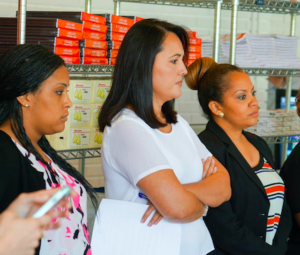Memphis parent Leisa Crawford didn’t have time to look through dozens of websites and zig-zag hundreds of miles around town to find a school for her child.
So she relied on word-of-mouth.
“When you live here in Memphis … you don’t go on the website,” she told members of parent advocacy organization Memphis Lift earlier this year. “We heard about KIPP, Snowden — OK, we’re going there. Or it’s a neighborhood school and we don’t even look past that.”
Parents have found it difficult to get information about schools because there are so many types to choose from compared to 20 years ago. So Crawford and dozens of parents like her are calling for a simpler way to access information about the more than 200 schools in Memphis.
- What: Parents in the Memphis area and beyond will gather to talk about education issues including unified enrollment. Panel discussions will include local district leaders as well as parents from Indianapolis, Chicago, Denver, and Washington, D.C. to share their ideas.
- When: 10 a.m. to 4 p.m. Saturday, Oct. 27
- Where: Perea Elementary School, 1250 Vollintine Avenue
They hope a process called “unified enrollment” will help them make sense of their choices and get their children into their favorite school. In unified enrollment, each family across the city would fill out a common application listing their top choices. They would then submit those choices electronically by a deadline that is the same for every parent. Often, information about schools is included on the application website.
Memphis schools have been segregated for decades. Currently, parents who are white, well-connected, and affluent have a better chance of getting into the best schools. They have more time to research, and so are more informed about school offerings, quality, and application deadlines.
But parents from low-income families, who are mostly people of color, often have less flexible schedules because lower paying jobs do not offer many opportunities for parents to take off from work to look for schools. This means they often miss school application deadlines — and better schools tend to fill up long before then.
“Over the years, we’ve talked with parents and grandparents who are frustrated with their neighborhood schools and are drowning in the process to enroll their children in high-performing schools,” said Sarah Carpenter, Memphis Lift’s executive director.
“They know their babies are not getting the education they deserve, but parents can’t always find a solution,” she continued. “The truth is, when parents can’t get access to quality schools, then real school choice doesn’t exist.”
A handful of cities see unified enrollment as a way to solve that problem, including Chicago, Detroit, Denver, Indianapolis, Los Angeles, New Orleans, Newark, N.J., and Washington, D.C. The program in Detroit never happened because of a toxic political environment, poor planning, and bad timing. Newark’s got off to a rocky start, but enjoys almost unanimous support from parents who use it.

Simplifying how parents enroll their children in Memphis schools is already in progress. Shelby County Schools now allows parents to apply and transfer to schools online — including its sought-after optional schools that require students to score well on tests. The district enrolls about 80 percent of Memphis public school students; the other 20 percent are charter schools or schools run by the state.
Unified enrollment has been floated twice before in Memphis — once in a 2015 report commissioned by the Achievement School District, and again during meetings last year , between Shelby County Schools and its charter sector. But talks haven’t gone far.
The 2015 report by the Institute for Innovation in Public School Choice included interviews with school leaders, education advocates, parents, and philanthropists, and said the city is ripe for unified enrollment.
National philanthropies have widely supported unified enrollment because they want traditional districts and charter sectors to collaborate on the process, and not compete with each other for students. To avoid claims of bias, some cities have brought in a third-party to manage the system.
Critics say unified enrollment unfairly helps the charter schools that otherwise wouldn’t have as big a platform to advertise their programs. Supporters say the benefits of unified enrollment outweigh the issues. Though many policymakers have called for changes in their unified enrollment systems, few have called to scrap them entirely.
Shelby County Schools’ application process would be combined with charter and state-run schools, which is a tough sell because the district sees those schools as competitors. School board members said as recently as this summer that charter schools are a significant financial burden that state lawmakers should help alleviate.
Still, district leaders’ interest has grown in recent years.
One of Shelby County Schools’ own, Sharon Griffin, has taken the reins at the state-run district. Griffin is known for her collaborative leadership. Her new role could help bring more cooperation between the state-run district and the local district and make unified enrollment more likely. But this is just one of many thorny issues for the two districts to sift through, including sharing student information, and managing crumbling facilities.
Last year, Shelby County Schools was more open to unified enrollment as part of a larger effort to educate parents on their choices, and even sent out a survey to charter operators to gauge interest.

“There is some interest,” said Natalia Powers, who oversees community engagement for the district, during a meeting last year on the issue. “Of course there are some questions about who would manage it, the funding, and all the logistic implications that go along with that. There is interest on both ends to have conversations about what that could look like.”
Ultimately, she said the parent’s interest should be top of mind as leaders consider a unified enrollment system.
“It’s not about the school leader,” she said. “It’s about ease and accessibility to parents.”
The change could help school operators too, said Carpenter, the parent advocate. Schools could track parent preferences more easily and give operators a better idea of how many students they will enroll. But the real winners would be parents, she said.
“Access and choice are different,” she said. “We have choice but we don’t have access to choice.”
Reporter Caroline Bauman contributed to this story.
The post As Memphis parents struggle to find information about schools, one parent group is calling for a simpler enrollment system appeared first on Chalkbeat.



